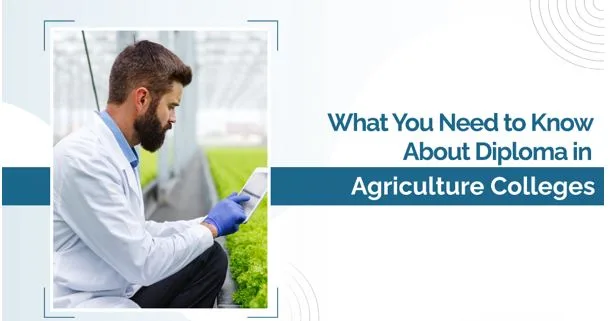Studying at Diploma in Agriculture Colleges: A Practical Guide
How would you like it if you stumbled across a short-term course that ensures a secure, promising career within a budget? Sounds like a dream, right? Not anymore, a diploma in agriculture is a vocational course designed for students interested in the agriculture sector.
It guarantees a first-mover advantage to the students enrolled for a diploma in agriculture colleges right after high school.
This course is the ultimate solution to the issues pertinent to the agriculture sector. It offers a sustainable solution to reinstate soil quality while increasing crop production with maximum utilization of scarce resources. The agriculture sector is the primary contributor to the national GDP, and it is worthy enough to outperform in the global economy with an active workforce of young agriculture professionals. Diploma courses in agriculture bridge the gap between skill demand and supply. Stay on the page to know more.
Why Students Choose a Diploma in Agriculture Over Degree Programs?
In a world of instant gratification and quick outcomes, a race against time keeps everyone on their toes. Maximum results with minimum effort in a short duration is the life mantra for students. It is a solid reason for the demand for short-term vocational courses, offering immense professional growth.
Students are intrinsically inclined towards a diploma in agriculture over degree courses, as it overcompensates for the shortcomings of degree programs. Stay tuned to find out why diplomas in agriculture colleges have an upper hand.
Duration, cost, and job-readiness factors
The course is designed for students who possess a keen interest in the primary sector and are reluctant to bring a change. Short duration, practical skills, industry exposure, and cost-savvy features have skyrocketed the demand for diplomas in agriculture colleges. General details of the course are mentioned below.
| Course duration | Fees (Annual) | Career opportunities |
| 1- 2 years | 20,000 – 1,50,000 INR | Farm management. Agriculture research, Marketing and agri sales, Government sector. |
Course duration and fee structure can vary based on the jurisdiction of the institute and location.
Focus on practical learning over theory
Diploma courses are heavily job-centric and aim at upskilling the students in a specific field through practical knowledge. Experiential learning has proved its mettle in quick learning over the years, which is incorporated into diploma courses. Workshops, farm visits, and fieldwork are the USPs of diplomas in agriculture colleges.
What Colleges Deliver in Diploma Agriculture Courses
Diploma courses in agriculture are jam-packed with all the goodness of traditional courses, minus a few years. The program is a blend of theoretical knowledge combined with its practical utility in real-time farming. The ratio of both makes the course unique and suitable for students on a time crunch. The credibility of the course is highly acclaimed by top agriculture institutes and government bodies. Students get industry exposure, farm visits, practice in fieldwork, and the opportunity to innovate through a diploma in agriculture colleges.
The course structure is meticulously designed as per industry standards in two parts:
Core curriculum subjects
The fundamental curriculum constitutes subjects related to agriculture and its allies. A deep understanding of agricultural mechanics and methodologies, the journey from traditional farming to modern techniques, is covered in the course. Theory and practical knowledge are two sides of a coin; one is worthless without the other. Major subjects covered under diploma in agriculture colleges are:
- Soil science
- Agronomy
- Horticulture
- Agriculture Engineering
- Plant pathology
- Agriculture Economics
- Entomology
Practical modules
Agriculture sciences are heavily dependent on practical learning; their entire curriculum is field-centric. Conceptual knowledge is limited to the pages of the books, eagerly waiting to be implemented in real-time through testing and experimentation. Sustainability projects, product testing, and innovative technological advancements are the ultimate aim to include practical modules in the curriculum of diploma in agriculture colleges. The major components of the practical modules are:
- Field Work
- Farm Visits
- Workshops
- Internships
- Laboratory
Post-Diploma Career and Education Options
The diploma is the final career showdown for some students, while it is an opening act for others, depending on their career goals. Usually, beginners pursue a diploma in agriculture colleges after the 10th grade, to upskill and get market exposure. Students easily land a beginner-friendly career in the agriculture sector, which is a good start for novice professionals to add some work experience to their resumes.
Students looking for serious job roles or those who are interested in agricultural research step up to advanced courses. Here’s a preview of what the future journey looks like while holding an agriculture diploma in hand.
Entry-level jobs
The course opens a Pandora’s box of opportunities in the sector, and each job role demands a specific skill set that is preferable. Agriculture science is in a progressive state and is heading towards sustainable farming practices, creating a huge demand in the research and development sector. Allied fields are welcoming diploma holders for multiple job roles in both the public and private sectors. Here is a complete brochure of job descriptions available at the hands of students enrolled for diplomas in agriculture colleges:
| Job Title | Job Description |
| Agricultural Technician | On-site work on the farm ensures incorporation of modern agriculture techniques, animal care, and farm maintenance. |
| Farm Manager | Supervise daily operations, training and supervision of staff, livestock management, and increasing crop productivity |
| Agricultural Extension Officer | Work closely with farmers to guide and aware them of new farming techniques, tools, and government programs aimed at enhancing crop quality and productivity |
| Animal Health technician | Works with veterinarians to assist in the well-being of livestock |
| Agricultural Sales representative | Promote and sell agriculture products and services to agricultural professionals and farmers |
| Horticulturist | Optimize plant growth and quality of produce through pest resistance |
| Rural Development Officer | Work with govt bodies or NGOs to implement and promote development projects for the rural sector |
| Agricultural research assistant | Assist in data collection, analysis, and interpretation for ongoing agricultural research |
| Agricultural entrepreneur | Manage self-owned farm, nursery, or business |
Options to upgrade to BSc Agriculture
Not every diploma holder might enter the job sector. Many are deeply interested in further research work or higher studies. BSc agriculture is often chosen as the next step to refine the knowledge base and become a part of the bigger picture. Final year students of diploma in agriculture colleges upgrade to graduate courses for better job roles and higher salary packages while expanding their knowledge quotient.
A Leap from diploma to degree gives an edge in the competitive job market and better chances of promotion in the workplace making it a smart move!



